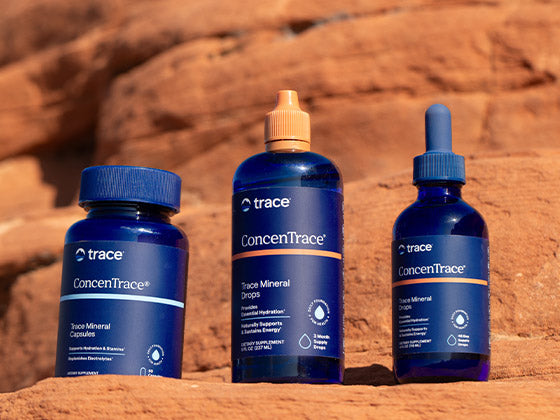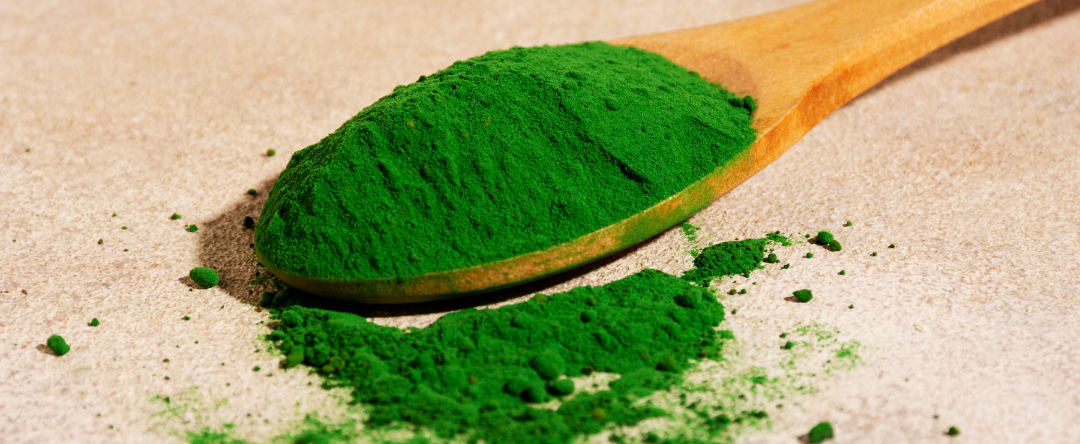At Trace Minerals, we don’t compromise on science, sourcing, or standards. With 50+ years of research and refinement behind every formulation, we deliver clean, bioavailable minerals your body absorbs. Our products are crafted with integrity; no shortcuts, no unnecessary additives. From athletes to everyday wellness seekers, we serve those who want results rooted in real science and backed by trusted, traceable ingredients.
You're not alone if you’ve heard of spirulina but aren’t sure what sets it apart. This vibrant green superfood is a dense source of nutrients, including protein, iron, and key antioxidants. People turn to spirulina to support energy, immune health, and recovery. Whether mixing it into smoothies or choosing supplements that include it, spirulina can fit naturally into daily wellness routines.
In this blog, we will answer the question, “What is spirulina?” and explain its key nutritional components, the science-backed benefits it offers for whole-body wellness, and practical ways to incorporate it into your daily routine.
Key Takeaways:
- What Is Spirulina: Spirulina is a nutrient-dense algae known for its high protein, vitamin, and mineral content, making it a powerful addition to modern wellness routines.
- Science-Backed Health Benefits: Extensive scientific research supports the potential health benefits of spirulina, including immune modulation, antioxidant and anti-inflammatory properties, and heart health.
- Smart Integration Into Daily Life: To effectively integrate spirulina into your daily routine, consider its quality, sourcing, and dosage, and consult healthcare professionals when necessary.
The Nutritional Profile Of Spirulina
When you look closely at spirulina, it’s clear why it stands out among natural supplements. Spirulina is a type of blue-green algae famed for its rich color and, more importantly, for its comprehensive nutritional makeup.
- Complete Plant-Based Protein Source: Spirulina contains approximately 60–70% protein by weight and offers all nine essential amino acids, making it one of the few plant-based sources of complete protein. It is ideal for supporting muscle maintenance and recovery without relying on animal products.
- Rich in B Vitamins for Energy & Nerve Health: Spirulina delivers notable amounts of B1 (thiamin), B2 (riboflavin), and B3 (niacin), which are essential for converting food into energy and supporting healthy nerve function, especially important for those managing fatigue or cognitive demands.
- Provides Essential Minerals Like Iron & Magnesium: This algae offers a meaningful dose of iron, which supports oxygen transport and energy production, and magnesium, a critical mineral for enzyme activity, muscle relaxation, and maintaining balanced nerve signaling.
- High in Phycocyanin & Antioxidants: The blue-green pigment phycocyanin gives spirulina its colour and acts as a powerful antioxidant. It helps defend cells from oxidative stress by neutralising free radicals and supporting resilience during physical and environmental challenges.
- Contains Beneficial Fats & Chlorophyll: Spirulina supplies small amounts of gamma-linolenic acid (GLA), an anti-inflammatory fatty acid, along with naturally occurring chlorophyll, which supports detoxification processes and cellular repair in the body.
- Low-Calorie, Nutrient-Dense Supplement: With minimal calories and carbohydrates per serving, spirulina efficiently boosts one's intake of essential nutrients, making it ideal for athletes, calorie-conscious individuals, or anyone seeking dense nutrition without added load.
Health Benefits Of Spirulina
Spirulina has been extensively researched as a natural source of protein, vitamins, and minerals.
Here’s what spirulina can offer for your wellness:
1. Nutrient-Rich Composition
Gram for gram, spirulina provides a significant amount of protein, about 60-70% by dry weight, along with B-vitamins (notably B1, B2, B3), iron, copper, and magnesium. This concentration of macro- and micronutrients makes it one of the most nutrient-dense foods available.
2. Antioxidant And Anti-Inflammatory Properties
Recent studies have shown that spirulina contains phycocyanin, a powerful antioxidant that gives it its unique green-blue color. Antioxidants help protect cells against oxidative stress linked to inflammation and chronic disease. Phycocyanin has also been shown to inhibit the production of inflammatory signaling molecules in the body.
3. Immune Support
Research indicates that spirulina may help modulate immune system activity. It appears to enhance your body’s defenses and regulate immune response, making it helpful in supporting optimal immune health, especially during periods of elevated stress or exposure to pathogens.
4. Heart And Metabolic Health
Several studies associate spirulina supplementation with improved lipid profiles, including reductions in LDL cholesterol and triglycerides, and increases in HDL cholesterol. It may also provide mild support for healthy blood pressure, contributing to cardiovascular wellness.
5. Support For Energy And Endurance
Due to its iron content and high-quality protein, spirulina can support oxygen transport and muscle recovery, potentially reducing fatigue and supporting energy levels. This has made it increasingly popular among athletes and those with active lifestyles.
6. Detoxification Assistance
Spirulina may support the body's natural detoxification processes. It has a binding effect on heavy metals and toxins, which can help remove them from your system, though it’s important to note that the clinical evidence is still emerging in this area.
By incorporating spirulina into a balanced nutritional approach, you can leverage its powerful combination of nutrients and health-promoting properties to support multiple aspects of your wellness.
Potential Side Effects And Safety Of Spirulina
Spirulina is generally considered safe for most people when consumed in recommended amounts. Rich in protein, vitamins, and minerals, it is valued for its purity and nutrient density. However, as with any concentrated superfood, it’s essential to understand the potential side effects and safety considerations.
- Generally Well-Tolerated by Most People: Spirulina is widely considered safe when taken in recommended amounts. It provides a dense source of protein, vitamins, and minerals without artificial additives or fillers.
- Possible Mild Digestive Reactions: Some individuals may experience nausea, gas, or diarrhea when first introducing spirulina. These effects are typically mild and can be managed by gradually increasing the dosage over time.
- Caution for Autoimmune Conditions: Due to its immune-activating properties, spirulina may not be suitable for those with autoimmune disorders such as lupus or rheumatoid arthritis. Medical consultation is strongly advised before use in these cases.
- Risks of Contaminated Sources: Spirulina can become contaminated with microcystins, heavy metals, or harmful bacteria if grown in uncontrolled conditions. Choose products tested by third-party labs for purity and safety.
- Special Considerations for Certain Individuals: To avoid unwanted interactions, pregnant, breastfeeding, or taking immunosuppressants or blood thinners should seek professional guidance before using spirulina supplements.
- Allergic Reactions are Rare But Possible: While uncommon, hypersensitivity reactions can occur. Those with known allergies to algae or similar supplements should begin cautiously and monitor for any signs of intolerance.
How To Choose High-Quality Spirulina Supplements
When adding spirulina to your daily routine, quality matters. Not all spirulina is produced or processed the same way, and this can impact both safety and nutrient content.
Here’s what you need to look for to make an informed and health-conscious choice:
Source And Origin
Spirulina’s environment plays a crucial role in its purity. Choose supplements produced in controlled, monitored environments where water quality and contamination risks are managed closely. Look for transparency around the region and conditions where the spirulina is cultivated—open information about freshwater sources reduces the risk of heavy metal or microcystin (toxin) contamination.
Third-Party Testing And Certifications
Check the label for third-party testing and quality certifications. Reliable manufacturers send their products for independent analysis to verify safety and nutrient content. Certification from organizations such as NSF International or USP can signal compliance with high contaminant standards, potency, and labeling accuracy.
Minimal Ingredient List
Review the ingredient list. Select products that contain pure spirulina with minimal, if any, additional ingredients. Additives, fillers, preservatives, or artificial colors can dilute the benefits and introduce unnecessary chemicals into your supplement routine.
Form And Dosage
Spirulina is available in powders, tablets, and capsules. Consider your preferences—powder integrates easily into smoothies, while tablets and capsules offer convenience and pre-measured doses. Ensure that dosage instructions are clear, and look for products that specify the amount of spirulina per serving so you can tailor your intake to your needs.
Packaging And Storage
Optimal packaging helps preserve spirulina’s nutritional integrity. Choose products packaged in opaque, airtight containers to protect against light, air, and moisture, which can degrade their nutrients. Proper storage recommendations on the label are also a good sign.
A careful approach to supplement selection helps you avoid contaminants and ensures you’re getting the concentrated nutrition spirulina naturally offers. Always investigate and invest in quality—your daily wellness depends on it.
Incorporating Spirulina Into Your Daily Routine
Adding spirulina to your day doesn’t require dramatically overhauling your habits. Its versatility makes spirulina fit seamlessly into various meals and health regimens. Whether you’re looking to boost nutrient intake, support muscle recovery, or add more antioxidants to your diet, Spirulina Daily Mineral Powder offers practical options for nearly every lifestyle.
- Smoothies & Shakes: One of the easiest ways to start is by blending our spirulina daily mineral powder into a morning smoothie or protein shake. Half to a full teaspoon mixes well with fruits like pineapple, banana, and mango, helping mask spirulina’s earthy flavor while delivering nutrients such as phycocyanin and B vitamins.
- Baked Goods: Spirulina can be folded into recipes for energy balls, protein bars, or even pancake batter. Add the recommended amount to your preferred recipe to amplify the nutritional profile and the visual appeal. It’s famous for its striking green color.
- Salads & Dressings: For savory applications, sprinkle spirulina over salads or stir it into vinaigrettes and hummus. A small amount goes a long way, enriching your meal with iron, calcium, and magnesium while helping balance dietary mineral intake.
- Capsules & Tablets: If you prefer not to change the flavor or appearance of your food, spirulina is also widely available in capsule or tablet form. This allows for precise dosing and makes it easy to add to your daily supplement routine, especially if you already take other vitamins and minerals.
Regardless of the method you choose, consistently incorporating spirulina is important to experiencing its potential benefits. Start with a small daily dose, monitor how your body responds, and adjust as needed in line with your nutrition goals and any existing health conditions. If you have underlying health issues or take medications, consider consulting with a healthcare provider before making significant changes to your supplement routine.
Final Thoughts
Understanding what spirulina is gives you another tool to bridge the nutritional gaps left by today’s modern lifestyles. Backed by solid science, spirulina’s dense profile of vitamins, minerals, and protein positions it as an efficient way to bolster your daily intake of essential micronutrients. Integrating nutrient-rich supplements like spirulina can offer measurable benefits for individuals who care about optimal hydration, sustained energy, and overall cellular health.
At Trace Minerals, we recognize that achieving true wellness is rooted in meeting your body’s foundational nutritional needs. Our Spirulina Daily Mineral Powder complements a balanced diet and fits seamlessly into the routines of athletes, busy professionals, and anyone striving to support immune function or improve recovery. Our scientific advisory board continuously evaluates emerging research so you can trust in both the efficacy and safety of what you add to your regimen.
Read also:
- Optimal Daily Electrolyte Levels For Hydration And Energy
- How Many Minerals Does Your Body Need Daily For Optimal Health?
- Is Salt An Electrolyte And Does This Mean All Salts?
Frequently Asked Questions About What Is Spirulina
What is spirulina?
Spirulina is a blue-green algae that’s considered a nutrient-dense superfood. It grows naturally in both fresh and saltwater environments. The powdered or tablet form on shelves is produced from carefully cultivated spirulina, then dried and packaged to preserve its nutritional value. As a supplement, spirulina is valued for its concentrated protein, vitamins, minerals, and antioxidants.
What are the primary nutrients found in spirulina?
Spirulina contains high protein levels, B vitamins (especially B1, B2, and B3), iron, magnesium, potassium, and small but essential amounts of trace minerals like manganese, copper, and zinc. It also offers a broad range of phytonutrients such as phycocyanin (responsible for its vivid color and antioxidant properties), beta-carotene, and gamma-linolenic acid (GLA).
Is spirulina a complete protein?
Yes, spirulina qualifies as a complete protein. It provides all nine essential amino acids your body can’t produce alone. For people seeking alternative protein sources, especially in plant-based diets, spirulina adds versatility and nutritional value.
Does spirulina improve energy levels?
Spirulina’s dense nutrient profile can support normal energy metabolism. B vitamins, iron, and protein contribute to your body’s ability to produce and sustain energy. While individual experiences vary, scientific studies suggest spirulina may help reduce feelings of fatigue in people with underlying nutrient deficiencies or high physical demands.
Is spirulina beneficial for heart health?
Research indicates that spirulina may support cardiovascular health in several ways. Thanks to its antioxidant content and specific compounds like phycocyanin, it can potentially help maintain healthy cholesterol levels and support normal blood pressure. Integrating spirulina into your diet as part of a healthy lifestyle contributes to heart wellness.
Can spirulina aid in detoxifying the body?
Spirulina contains chlorophyll and a unique combination of nutrients that can bind to certain toxins and heavy metals, supporting your body’s natural detoxification pathways. Current evidence supports its use as part of a balanced approach to detoxification, especially when combined with adequate hydration and mineral intake.
How does spirulina help with allergies?
Some scientific studies suggest that spirulina may modulate immune response and reduce symptoms related to seasonal allergies, such as nasal congestion and sneezing. Its anti-inflammatory properties are thought to play a role, though individual results may differ.
How does spirulina support the immune system?
Spirulina is rich in antioxidants, peptides, and vitamins critical to immune function. Key compounds like phycocyanin help reduce oxidative stress and may enhance the activity of immune cells. Regular use can help support your body’s defenses, particularly when paired with sufficient intake of essential minerals like those sourced by Trace Minerals.
Sources:
- Podgórska-Kryszczuk I. (2024). Spirulina-An Invaluable Source of Macro- and Micronutrients with Broad Biological Activity and Application Potential. Molecules (Basel, Switzerland), 29(22), 5387. https://doi.org/10.3390/molecules29225387
- Fernandes, R., Campos, J., Serra, M., Fidalgo, J., Almeida, H., Casas, A., Toubarro, D., & Barros, A. I. R. N. A. (2023). Exploring the Benefits of Phycocyanin: From Spirulina Cultivation to Its Widespread Applications. Pharmaceuticals (Basel, Switzerland), 16(4), 592. https://doi.org/10.3390/ph16040592
- Karkos, P. D., Leong, S. C., Karkos, C. D., Sivaji, N., & Assimakopoulos, D. A. (2011). Spirulina in clinical practice: evidence-based human applications. Evidence-based complementary and alternative medicine : eCAM, 2011, 531053. https://doi.org/10.1093/ecam/nen058
- Finamore, A., Palmery, M., Bensehaila, S., & Peluso, I. (2017). Antioxidant, Immunomodulating, and Microbial-Modulating Activities of the Sustainable and Ecofriendly Spirulina. Oxidative medicine and cellular longevity, 2017, 3247528. https://doi.org/10.1155/2017/3247528






